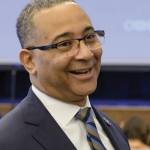Terry Rifkin
Copy Editor
February 9, 1999
In a visit to campus on Monday night, Reverend Jesse Jackson spoke about the importance of student activism and called upon the Trinity community to stand up for freedom and equality. Approximately 650 people attended the speech, which was sponsored by the President’s Office, Imani and the MultiCultural Affairs Council. His audience consisted of faculty, administration, community leaders and at least 300 Trinity students.
President Dobelle introduced Jackson as “A man who occupies a truly remarkable place in the American story.” Dobelle spoke of Jackson’s beginnings in the civil rights movement at the age of 22 and his activism with Dr. Martin Luther King, Jr. He went on to discuss Jackson’s two bids for the presidency and his diplomatic work on hostage release in the Middle East.
“For almost 30 years he has driven heroically to give voice to the voiceless and ensure liberty and opportunity for all,” said Dobelle, who also noted Jackson’s particular devotion to the youth of America and his efforts to unite the nation. Jackson began his talk by discussing the current impact of Dr. King on American civil rights. He proclaimed his distress at some people’s notion of King as a “ineffective dreamer,” saying that, “[King] spoke truth to power and did truth to power.” Jackson enunciated King’s dream of all Americans living under one tent, where people of color were not marginalized and all Americans would be treated equally. Quoting from Emma Lazarus’ poem “Colossus,” Jackson recited “Give me your tired, your poor, your huddled masses yearning to breathe free…” saying that yearning is the price of admission to the one, multi-cultural tent. King identified the first step toward building this tent as gaining equal protection for all citizens under the law, and he did this by changing the law, explained Jackson.
Jackson continued by introducing his theory of a four movement Freedom Symphony. The first, second and third movements have all been realized: the end to legalized slavery, the end to “legalized apartheid” (segregation) and universal suffrage in the United States. Jackson challenged the audience to move beyond our conditioning, to come alive and choose hope over dope.” He urged the audience to become trustworthy members of society and to get a sense of religion.
“Change comes when people are oppressed, they can change minds. Slave owners don’t retire… [but] strong minds break strong chains,” Jackson reflected.
The fourth movement of Jackson’s symphony has yet to be achieved: Americans do not have equal opportunity to access capital. Citing Connecticut as an example, Jackson lamented the conditions in the three poorest cities of the wealthiest state per capita, Bridgeport, Hartford and New Haven. He announced that sending a child to jail is more costly than sending a child to school and mourned the national standard of first class jails and second class schools in rural and urban areas. He dared our generation to change the current course of events, “Lift them up, don’t lock them away.
Many common misconceptions about poverty in America were quickly dispelled, “Most poor folks work everyday,” said Jackson. “They are not on welfare… But when they get sick they can’t afford health care… 50 million Americans do not have health insurance.
Challenging the student body to face the issues of our day, Jackson called for a fight for multi-cultural education. “It is activism. Education at its best is preparation to cope with and interpret life’s circumstances. You cannot eliminate folks because you don’t like them.
Jackson believes that Clinton won the election because he was willing to cope with the multicultural American population. However, Jackson was quick to add that what is happening with Clinton is not a definition of American morality. Jackson is forgiving of Clinton’s wayward behavior, saying “All have sinned, just put all of life’s stuff into perspective.” He sees today as, morally speaking, the high point in American public policy, “Slavery was the lowest moral state. Today more people have more potential under the law than ever before.”
Jackson also condemned the religious right, stating that,”We’ve already put Newt Gingrich on the midnight train to Georgia and we are trying to send Trent Lott back to private life.”
In Jackson’s closing remarks he described character as how one responds to a situation. Skin color and culture do not make up character, Jackson explains, character is intentionally sought out by an individual who understands that “the core of character is caring.”
The lecture concluded with a small group of activists chanting with Jackson, “Keep hope alive” and a group prayer led by the reverend. After the prayer Jackson announced, “I vote wherever I live and I live wherever I slept for the last 2 or 3 nights. Register to vote where you live.” Jackson persuaded over 200 members of the audience, who were not registered to vote in the state of Connecticut to go up to the front where voter registration forms were provided, and join the American body politic.
The reaction to Jackson’s speech was positive. Megan Fowler ’99, Student Government Association Vice-President said, “It was the best speech I’ve heard since Maya Angelou. The Reverertd was powerful and inspiring. He’s exactly the type of speaker this school and this generation need.”
Vice-President of the Multicultural Affairs, J. Russell Fugett ’01, was pleased with the turn out which was “About what 1 had expected.” For some it was their first experience with Jackson and his approach to politics.
Fatou-Maty Diouf ’02, said, “I was very pleasantly surprised. I thought that he would predominantly deal with the black movement, but he indicated the gay rights movement. People forget a lot, that everything is connected to one another.”
Jackson spoke at two engagements prior to the event at Ferris. He spoke to the Umoja house where a diverse group of students gathered to hear him speak. “I’m not excited at all,” said Davina Coard ’02, “I want to know why people listen to him. I don’t agree with a lot of things he has to say, but I do think he’s a good motivational speaker. If it was Martin Luther King, I’d have positive things to say, but I’m glad that he’s bringing people together.”
Jackson also spoke at Hamlin Hall to a gathering of faculty and community leaders. He discussed the need for equal opportunity access to capital and summarized by saying, “It’s a long way from the back of the bus to Wall Street.”


+ There are no comments
Add yours